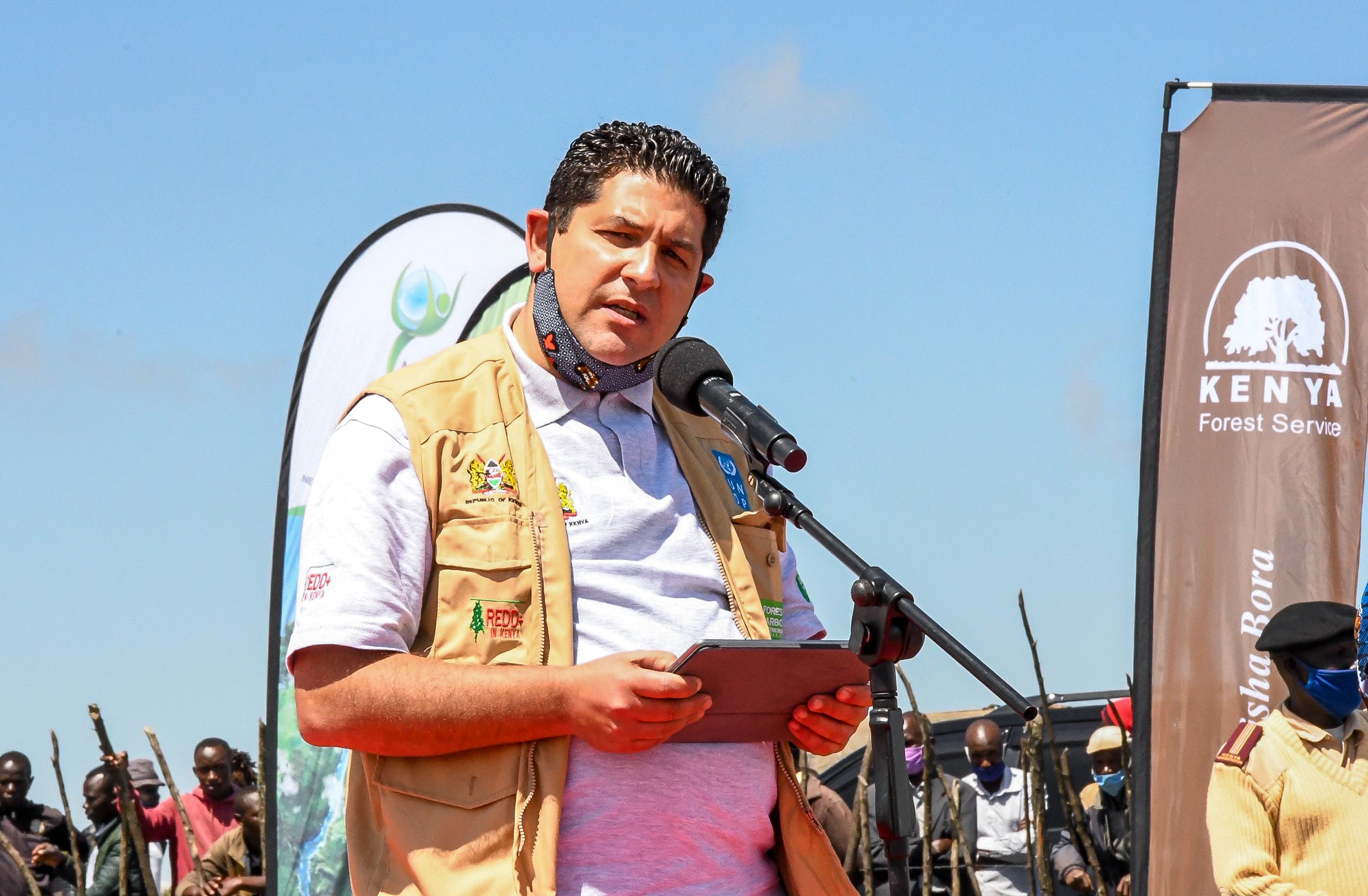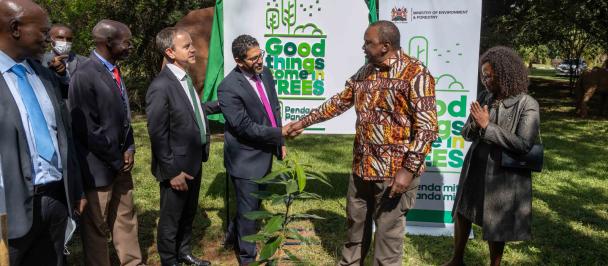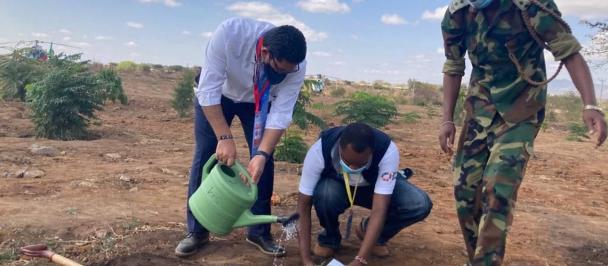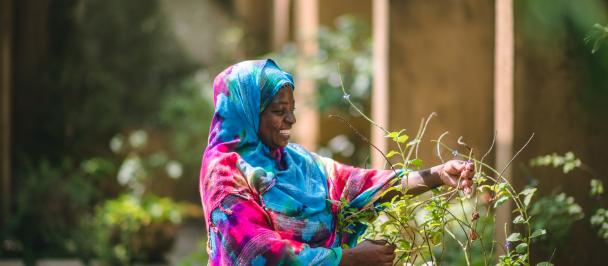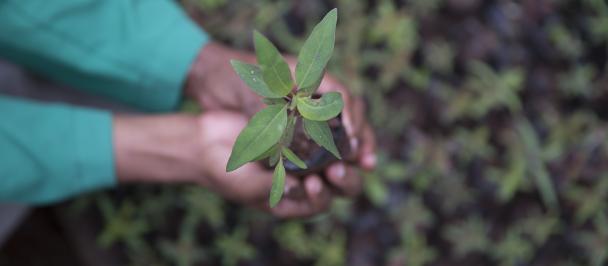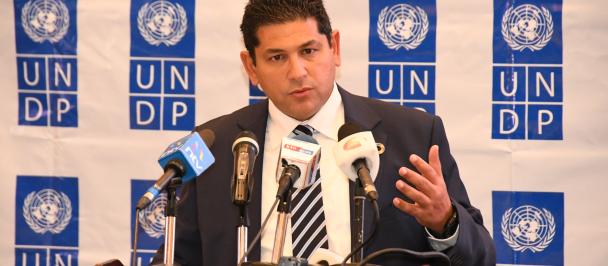United Nations Development Programme (UNDP) Resident Representative Mr. Walid Badawi speaks at the launch of the program for conversion and restoration of Kaptagat forest water tower into a natural forest and hand over of Elgeyo Marakwet County Sustainable Forest Management and Tree Growing Policy in Sabor forest, Elgeyo Marakwet County. (Photo: Christabel Chanda-Ginsberg/UNDP Kenya).
[Protocol]
It is my sincere pleasure to be with you here in Sabor forest, home of Champions, and amongst us today we are indeed in the presence of one of the world’s greatest champions, Mr. 159 himself, Mr. Eliud Kipchoge.
I am pleased to be with you at this very important launch of the programme for conversion and restoration of Kaptagat forest water tower into a natural forest. Which also coincides with a historical day 75 years ago when the UN charter was signed.
Allow me to applaud the Government of Kenya for the strong commitment it has demonstrated over the years to the UN sustainable development agenda. Let me also commend the Government of Kenya for the great strides it has made in addressing climate change, an instrumental step in delivering on the UN Framework Convention on Climate Change (UNFCCC) ambition as well as the Sustainable Development Goals.
Climate change presents one of the most serious developmental challenges in our world today. The Intergovernmental Panel on Climate Change (IPCC) in 2018 released a scientific report indicating the urgent need to limit global warming to 1.5℃, or below. This can only be achieved by stopping the rise in greenhouse gas emissions. Globally, around 17% of greenhouse gas emissions are generated through forest loss and forest degradation. Kenya, loses about 12,000 hectares of forest each year through deforestation. About 12% of the land area which was originally covered by closed canopy forests has been reduced over time, due to
- demand for fuelwood and charcoal,
- population pressure for settlements,
- infrastructure development,
- demand for wood products; and
- conversion to agriculture.
Allow me to recognise the bold measures Kenya has taken to secure the country’s sustainable development trajectory. The country boasts a very progressive constitution with sustainable development at its core. It is home to two UN Headquarters (UNEP and HABITAT), it’s vision 2030 and the MTP3 have mainstreamed fully the SDGs and next month Kenya will be presenting its 2nd VNR to the UN’s HLPF. More recently, and I would like to congratulate Kenya for its successful bid to secure a non-permanent seat on the UN Security Council, with Sustainable Development a core pillar of Kenya’s global Peace and Security agenda.
I would also, like to acknowledge the commitment and target set by the Government of Kenya to reduce emissions by 30% by the year 2030, as outlined in the Nationally Determined Contributions. Kenya has put in place a robust policy framework, including the 2nd National Climate Change Action Plan 2018 – 2022, to guide practical adaptation and mitigation of climate actions and the journey to a post COVID 19 low carbon and climate resilient development pathway.
Through our varied interventions which include:
- the United Nations Joint Programme on Reducing Emissions from Deforestation and Forest Degradation (UN-REDD),
- the Central Africa Forest Initiative (CAFI),
- the Forest Carbon Partnership Facility (FCPF),
- the Community Based REDD+ Programme with UNDP’s Global Environment Facility Small Grants Programme, and
- the Governors Climate and Forests Taskforce Initiative, amongst others,
UNDP supports countries in REDD+ readiness to develop national REDD+ strategies and investment plans; which provide the overall vision, policies, measures and actions to address deforestation and forest degradation. In doing so, UNDP has applied robust social and environmental safeguards to ensure that indigenous peoples, local communities, and forest dependent communities are benefiting from efforts to mitigate climate change.
I would like to commend the Ministry of Environment and Forestry for putting in place a strategy to increase Kenya’s forest cover to 10% and to restore 5.1 million hectares of deforested and degraded forests and other landscapes by 2022. This commitment not only aims to deliver a national goal but also contributes to various global initiatives, including the African Forest Restoration Initiative, the Bonn challenge, the New York Declaration on Forests, the Convention on Biodiversity and the Paris Climate Change Agreement. UNDP is committed to support the implementation of the National Strategy for Achieving and Maintaining over 10% Tree Cover. Allow me to highlight that UNDP is a member of the Multi-Institutional Technical Implementation Committee at the invitation of the Ministry and will provide the support needed to implement the National Strategy on 10% forest cover.
UNDP is supporting the Ministry of Environment and Forestry to review the National Forestry Policy, under the leadership of the Cabinet Secretary. This will go a long way in supporting the efforts of forest conservation and management and such programs being launched today.
Similarly, UNDP has supported Elgeyo Marakwet County under the leadership of Governor Tolgos to develop the Sustainable Forest Management and Tree Growing Policy, which we hand over today to the Governor. I would like to congratulate the Governor of Elgeyo Marakwet County, the County Commissioner and the Speaker of the County Assembly for their concerted efforts, collaboration and delivery of the Policy. The preparation and delivery of the Policy was made possible through an intensive stakeholder engagement process that included local communities, indigenous communities, CSOs, the County Government and the Ministry of Environment and Forestry. Other Counties can learn from Elgeyo Marakwet and develop their Forest Management Policies.
Indeed, the people of Kenya, stand to benefit from the forestry policies at both national and county level through the opportunities that these policies will create; including the creation of work opportunities and green jobs for youth that will derive from the restoration of forests and green spaces, expansion of fruit tree growing on private land, and enhanced governance of forestry resources.
As the world struggles to cope with the severe health impacts of COVID-19, efforts are also gradually shifting to address the socio-economic impacts of the pandemic. UNDP is pleased to be playing a supportive role in the efforts of the country, at both national and devolved levels, as it develops its recovery strategies. Indeed this is an unprecedented opportunity for the world and indeed Kenya, to take advantage of what has been termed the “Great Reset” and strive to build back better, harnessing the power of technology, creating green jobs and ensuring far greater resilience in development planning.
UNDP is committed to continue supporting multi-stakeholder dialogue processes that will help find innovative solutions to some of the challenges faced by the country, including in the Forestry and Natural Resources Management sector, which must better reflect efforts to build resilience to natural hazards and disasters such as the flooding incidents witnessed in April 2020, which took the lives of more than 28 people with many others still missing. UNDP expresses our deep condolences for this tragic loss of life and we are already engaging with the National Drought Management Authority (NDMA), to do a needs and recovery assessment very soon.
I would like to thank the European Union (EU) for its continued partnership with UNDP and other UN agencies in supporting Kenya in the post Covid 19 recovery phase and in many other areas of programming. UNDP was pleased to have been invited yesterday by the Ministry of Environment and Forestry to participate in the community dialogue surrounding the EU funded WaTer Towers Programme. As requested yesterday, UNDP stands ready to support the dialogue process moving forward, bringing to bear its experience in working with the various stakeholders to deliver policies and programs for the people of Kenya.
In conclusion, I would like to reiterate that UNDP will utilize its “integrator” role in mobilizing partners to work collaboratively with government, communities, the private sector, and civil society, to support counties implement sustainable forestry management approaches, and deliver on the MTP III, the SDGs and 2030 Agenda. As UNDP through our CPD 2018-2022, we look forward to accelerating our own commitment and support to the REDD+ process in Kenya and to working with all partners to take ambitious action to leave no one behind and recover better from COVID-19.
Asanteni

 Locations
Locations